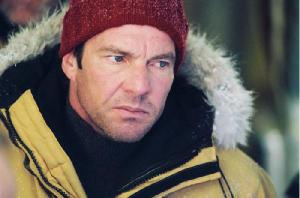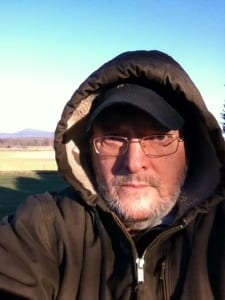Could a Massive Climate Shift Really Happen? –
The Big Picture –
By Glynn Wilson –
LURAY, Va. — It’s been so cold the past couple of days that I’ve felt like a character in the movie “The Day After Tomorrow.” I woke up just before dawn this morning and the iPhone weather said it was 19 degrees outside, but you know dogs. They have to go outside to pee no matter how cold it is.
Standing there in the inn parking lot looking up at the stars over Shenandoah in a new heavy coat with a fake sheep skin lined hood, sort of like the one Dennis Quaid wore in the movie, I kind of expected to go back inside and get online and find out that the president of the United States had ordered an evacuation of the northern states to Mexico.
While I’ve been writing about climate change due to global warming, Reuters is writing about how all 50 states are seeing freezing temperatures.
Googling around to see if there was any research on whether the scenario in the movie could actually happen, I stumbled on this article from Jeffrey Masters, Director of Meteorology at Google’s Weather Underground.
The Day After Tomorrow: Could it really happen?
The disaster film epic, The Day After Tomorrow™, depicts a world where global warming triggers an abrupt climate change, creating a global superstorm that unleashes unimaginable worldwide weather disasters. In the span of just a few days, tornados devastate Los Angeles, huge hail pounds Tokyo, and colossal tsunamis and blizzards whip New York. Could it really happen? Could global warming really cause such incredible disasters?
Like much science fiction, The Day After Tomorrow is based on some solid scientific fact. Recent scientific discoveries show that the present day climate is unusually stable, and that “normal” climate for Earth is the climate of frequent extreme jumps- — like a light switch flicking on and off. Thus, the popular conception that global warming will lead to a slow and steady increase in temperature that humans can readily adapt to may be incorrect. Global warming could push the climate system past a threshold where a sudden, irreversible climate shift would occur.
This would most likely happen if the increased precipitation and glacial melt water from global warming could flood the North Atlantic with enough fresh water to slow down or even halt the mighty Gulf Stream ocean current. Without the Gulf Stream pumping warm, tropical water to the North Atlantic, average temperatures would cool in Europe and North America by 5°F or more in just a few years- — not enough to trigger a full-fledged ice age, but enough cooling to bring snows in June and killing frosts in July and August to New England and northern Europe, such as occurred in the famed “year without a summer” in 1816.
In addition, shifts in the jet stream pattern would bring about severe droughts and damaging floods in regions unaccustomed to such events, greatly straining global food and water supplies. Climate experts consider a sudden global warming-induced climate shift unlikely in the next 100 years, but do acknowledge their computer models are too crude to know just what the probabilities are.
What? Really?
But wait. There’s more.
The link is now giving me trouble, but Masters goes on to say the climate shift depicted in the movie could not happen and claims the story is based on science fiction by a UFO conspiracy nut. But in another article entitled “The Science of Abrupt Climate Change: Should we be worried?” Masters concludes:
“The historical records shows us that abrupt climate change is not only possible — it is the normal state of affairs. The present warm, stable climate is a rare anomaly. It behooves us to learn as much as we can about the climate system so that we may be able to predict when the next abrupt shift in climate will come. Until we know better when this might happen, it would be wise to stop pouring so much carbon dioxide into the air. A nasty surprise might be lurking just around the corner. In the words of Dr. Wally Broecker, ‘the climate system is an angry beast, and we are poking it.’”
No shit Sherlock. I think it’s about time to fly south for the winter.















